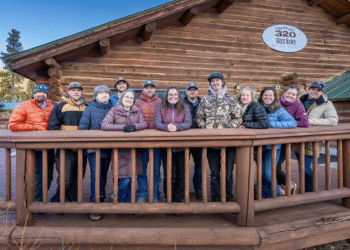By Doug Hare EBS STAFF
Kari Gras spent the bulk of her childhood years in Pittsburgh, Pennsylvania. After graduating from Georgia Southern University majoring in outdoor recreation, with a minor in business and biology, she lived in eight different states before moving to Big Sky two decades ago.
Her company TogetHR Consulting has hired three consultants in the last two years, providing HR, payroll, recruiting and bookkeeping services to small businesses across the Gallatin Valley.
Like most good Montanans, Gras enjoys the outdoors—wakesurfing on Hebgen Lake in the summer, exploring Lone Mountain in the winter, and scuba diving and sailing on vacations. In her interview with Explore Big Sky, Gras offers plenty of sage advice for both employers and employees alike.
Explore Big Sky: You moved to Big Sky in 1999. What drew you to a ski town in Montana?
Kari Gras: I moved to Big Sky in 1999 to land a career job at the Yellowstone Club and followed my boyfriend, at the time, along with our roommate from Vail, Colorado, Eric Ladd.
EBS:Can you tell me more about your employment history since moving here?
K.G.: I worked for the Y.C. from 1999 until 2005 in various roles, but my true passion was working with kids in an outdoor setting. I began as their Children’s Director overseeing and creating these programs along with the children’s ski school.
In 2005, I decided to explore another career opportunity and I accepted a seasonal position with the Big Sky Fire Department as a firefighter and EMT. In April of that year, I transitioned into working as a property manager with Continental Concierge, a sister company of Continental Construction. Around 2007, another position became available at Y.C. working in the payroll department, so I returned. Working there through the bankruptcy, as people left and were laid off, I emerged as the HR and Payroll Manager in 2009. I remained in that position until leaving in the spring of 2013.
EBS: How did you decide start TogetHR consulting?
K.G.: I first started my business under the name Gras HR Consulting, with the help of my friend Lindsey Pruiett at Pruiett Creative and Prospera Business Network in Bozeman. The more I shared the idea of helping small businesses with their human resources needs, the more my business has grown and continues to grow today! There are a lot of small businesses in the Gallatin Valley and most of them don’t need an HR or payroll person full-time and that’s where TogetHR Consulting fits in perfectly.
EBS: What is the most memorable client that you’ve had? How were you able to help their enterprise?
K.G.: This is a tough one to answer because I’ve had the opportunity to work with so many wonderful business owners and employees throughout the years. I have a couple of success stories about coaching owners and managers to have difficult conversations with employees about their performance and watching those employees turn their performance around and become a better employee and teammate. It doesn’t happen that often, but when it does, it’s wonderful to see that good HR practices do work.
EBS: What is the best business advice that you’ve received over the years?
K.G.: We get what we tolerate. I wish I could remember who I heard this from. It’s great advice for anyone with employees and can be applied to all aspects of life. It’s about setting healthy boundaries and communicating clearly. I use this quote in my trainings quite a bit.
EBS: Many of the small businesses in Big Sky don’t have an employee dedicated to human resources. What do they tend to miss out on?
K.G.: If a small business doesn’t have someone dedicated to HR they run the risk of not being up-to-date with employment law or in compliance when things are changing. I make sure my clients have up-to-date policies in their handbooks, compliance practices with paperwork, and hopefully soon I will get back to teaching classes for managers and/or owners.
For example, there are a couple big changes coming in 2020 with regard to exempt versus non-exempt employees and those classifications—not to mention a new W4 and minimum wage increase for Montana to $8.65/hour.
EBS: What are some ways that small companies mismanage their payroll operations?
K.G.: Generally speaking, it’s a common practice for employers to require their employees to get approval before working any overtime hours. While this is a great practice, where companies get into trouble is when they remove those overtime hours already worked, don’t pay the employee what is owed and simply tell the employee it wasn’t approved, and therefore, they aren’t paying them.
The other common mistake I see is upon termination, when the company doesn’t have a policy that outlines when the employee will receive their last paycheck. It’s Montana law that the employee must receive their final paycheck at the end of business that day, unless there is a company policy that states otherwise. That policy must be worded in a specific way and indicate when the employee will receive their final paycheck.
EBS: What regulations are the most common ones that are not followed by companies, that might be unaware they are not treating employees fairly/legally?
K.G.: This is definitely the situation of paying an employee as an exempt versus non-exempt employee. Common business terms and practice is to pay employees hourly versus salary and most businesses think that as long as an employee has ‘manager’ in their title, they don’t have to pay them overtime.
Under the FLSA (Fair Labor Standards Act) there is a duties test that qualifies an employee to be paid as an exempt employee and this is a white-collar exemption. If the employee doesn’t qualify or perform work within the five classifications, as defined, then that employee must be paid as an hourly employee, even if they are a manager.
EBS: What do you see as the most difficult part of growing an organization rapidly?
K.G.: Currently, that would be more jobs to fill than people available. The unemployment rate in Gallatin County is currently 2.6 percent and below the state’s non-seasonally adjusted average of 3.3 percent. Not to mention the affordable housing dilemma in Big Sky. Despite these hurdles, I think Big Sky businesses are doing their best to collaborate with each other, offer affordable housing options for their employees along with competitive wages and benefits packages.
EBS: What is your advice for an employer to retain the most talented/effective employees?
K.G.: Build a benefits package that suits your employees, be fair, equitable and mainly ask your employees, “What matters most to you?”. Sometimes, the answers may surprise you!














